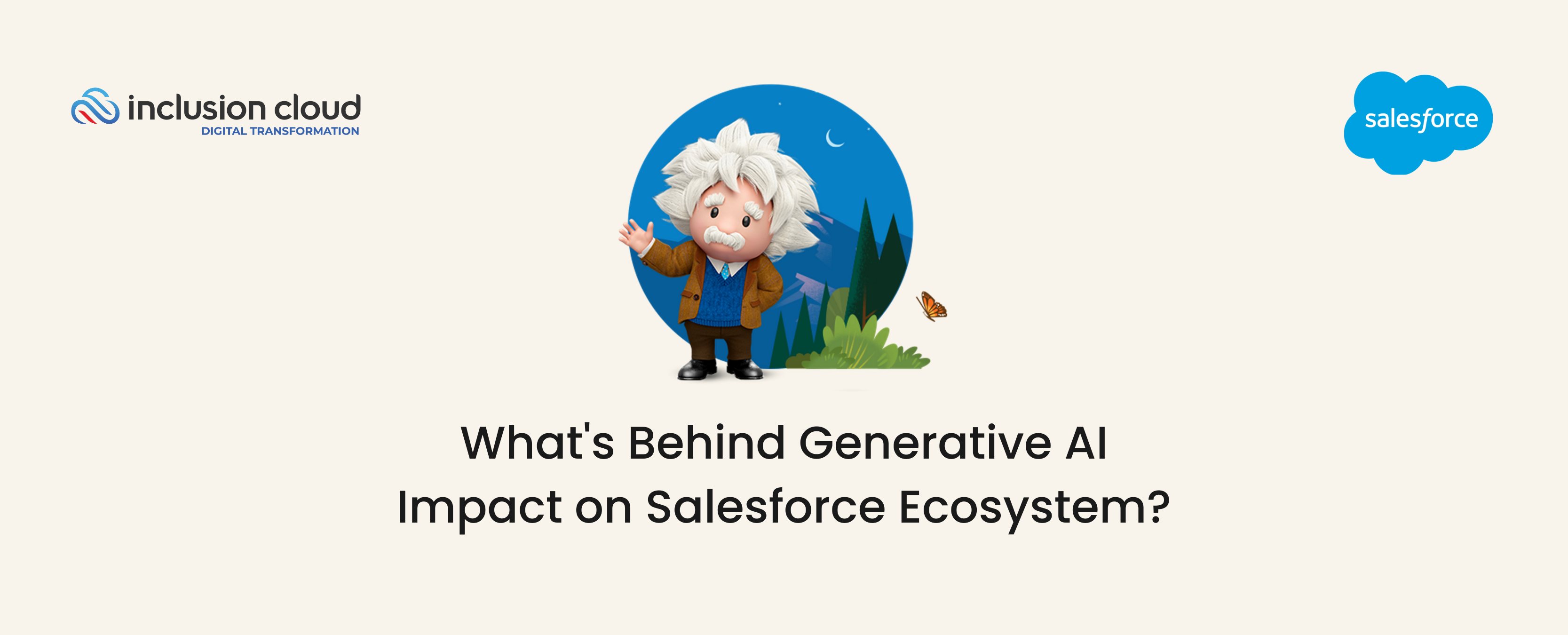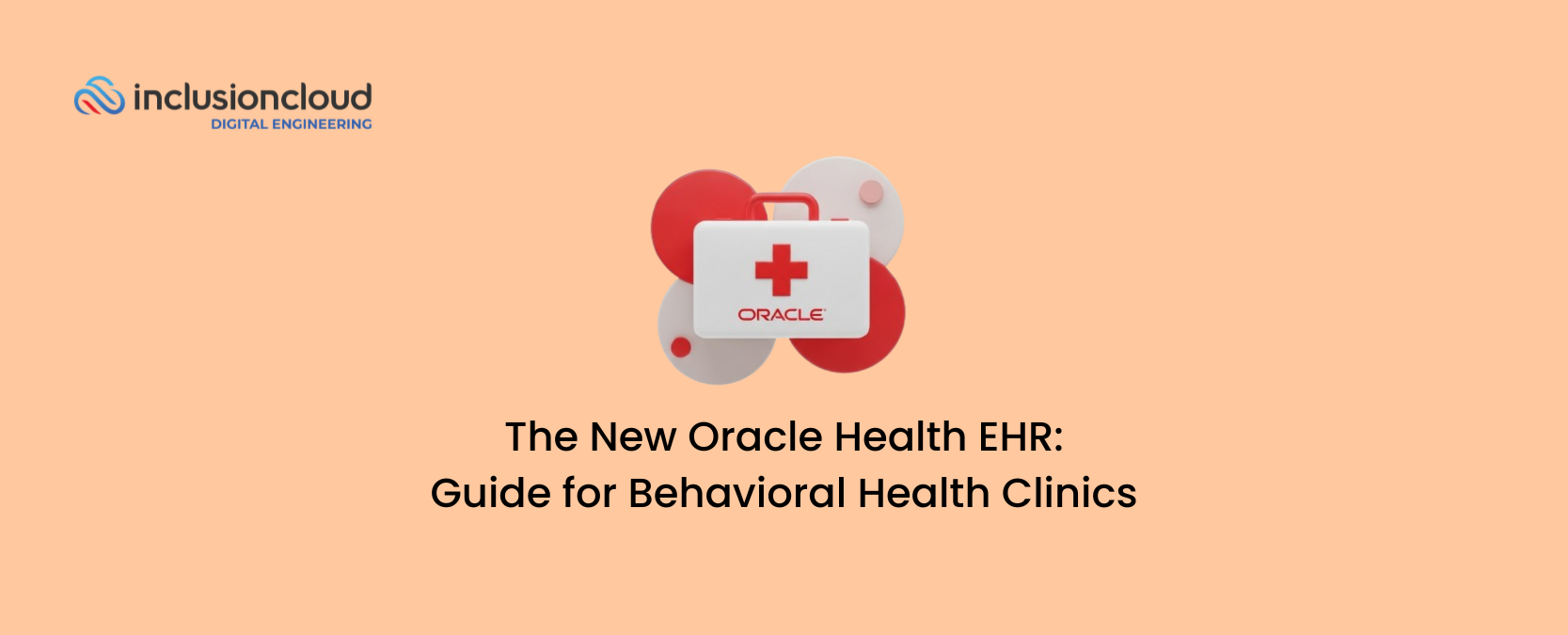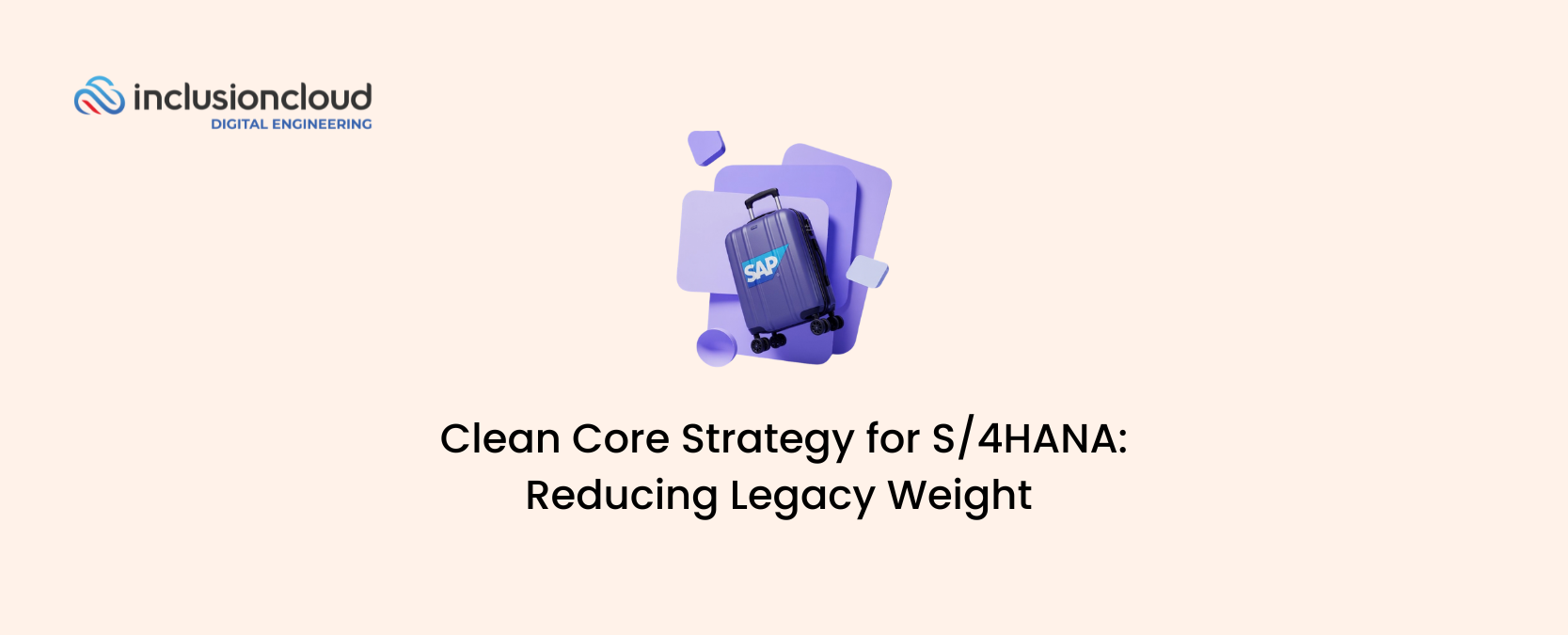One thing is crystal clear about generative AI: Change is on the horizon, and we are here to guide you through the transformative impact that generative AI is ushering into the Salesforce ecosystem.
Beyond the marketing buzz, there is a tangible reality. It’s projected that Salesforce and its partner ecosystem will generate over $2 trillion in revenue and create 11.6 million jobs by 2028. This economic impact will undoubtedly ripple across various domains, including Salesforce-related employment opportunities, job roles, customer experiences, business outcomes, and the future evolution of the Salesforce platform.
The journey of Salesforce’s transformation into a deeply integrated AI platform can be traced back to 2014 when Marc Benioff boldly declared, “Salesforce will become an AI-first company.” The vision was to craft an intelligent, user-friendly CRM accessible to every company and employee.
From there, Salesforce embarked on two significant phases concerning AI, which we will delve into later in this article:
- The AI Predictive Phase.
- The GenAI Phase.
After revisiting its history, we’ll return to the present to explore Marc Benioff’s 2024 vision for Salesforce, emphasizing their core value of trust in generative AI development.
The central goal of our guide on the impact of Gen AI in the Salesforce ecosystem is to delve deeper into the three dimensions undergoing substantial changes in 2024:
- Changes affecting end-users of the platform.
- Transformations in Salesforce-related job roles.
- The tangible impact on businesses and their operations.
To conclude this article, we will address other fundamental questions that are crucial for Salesforce insiders and businesses considering Salesforce implementation: What are the primary barriers to AI adoption? And is partnering with an implementation expert truly essential for successful AI adoption?
Join us on our way across the vibrant Salesforce ecosystem, where we’re excited to find out what new transformations await us all in the next years!
Why Salesforce Ecosystem?
To understand Salesforce’s dominant position in the field of generative AI, it’s important to recognize the fundamental importance of cloud computing. Cloud computing has transformed the way businesses operate by enabling the movement of important applications from on-premises systems to cloud-based solutions. These cloud-based systems have various benefits, such as improved management, seamless upgrades, and resource economy. In essence, cloud computing is the foundational approach for firms beginning on their digital transformation path.
This transition is at the heart of digital transformation, allowing businesses to adapt software applications, shift processes, introduce new products, and gain deeper customer insights more efficiently and effectively.
So why the intense focus on cloud computing? It’s simple: cloud applications are pivotal to digital transformation and, by extension, the adoption of AI. Cloud computing is the cornerstone upon which AI applications are built and scaled. AI, by its nature, demands significant resources, especially when operating at full capacity. In short, being cloud-based means optimizing computing resources as needed and spending fees in proportion to how much resources are actually used.
In this context, Salesforce emerges as a leader. Their vast experience in cloud solutions coupled with a deep understanding of AI’s potential, positions them to offer robust generative AI solutions. To wrap up, Salesforce provides businesses with the tools necessary to harness the full potential of Gen AI, fostering innovation, and efficiency, and supporting the ongoing goal of digital transformation for businesses.
Salesforce’s Vision on AI: Trust
Salesforce’s vision for generative AI, as stated by CEO Marc Benioff, is based on one fundamental value: trust. This strategy is a response to the fast growth of AI technology, particularly with the introduction of tools like ChatGPT. Salesforce, like other global leaders in technology, is incorporating generative AI into its platforms, but its approach is distinguished by a focus on ethics and transparency.
Benioff points out that “The AI revolution is a trust revolution,” underlining the ethical problems that will be critical in AI’s next expansion phase. This strategy was strongly revealed at Dreamforce 2023 when Salesforce unveiled new Einstein GPT features. Without a question, the event’s star was Einstein Trust Layer, which promised a generative AI integration that was secure, anonymized, and responsible for managing data and creating value from it.
Benioff’s insistence that “your data is not our product” contrasts with the prevalent data practices in the industry, notably in social media. He criticizes current AI models for their reliance on extensively harvested web data, leading to issues like inaccurate outputs or ‘hallucinations’. His vision is to prevent AI from mirroring the pitfalls of social media, where data misuse and misinformation are rampant.
That’s basically Einstein’s job. Salesforce’s goal is to enhance data privacy, reduce bias and hallucinations in AI models, enabling businesses to make informed decisions with CRM data. This benefits Salesforce users, enhancing productivity and customer service.
Beyond products, Benioff advocates AI industry regulation to gain public trust, drawing parallels to skepticism in social media. He stresses the importance of avoiding AI becoming an “ultimate liar” or a source of plagiarized content.
Brief History: Salesforce AI phases
1. Before Einstein: The predictive phase
Salesforce’s AI journey started in 2014, with Marc Benioff’s vision to pivot Salesforce into an AI-first company. This era, known as the Predictive AI phase, saw Salesforce transition from a basic system of recording, and storing customer data, to a smart system capable of making pattern predictions using the stored data.
A key milestone was the acquisition of RelateIQ in 2014, which bolstered Salesforce’s capabilities in machine learning, especially in analyzing workplace communications for insights and reminders. In 2015, Salesforce introduced the Opportunity Scoring AI model, marking the company’s early foray into predictive AI. This phase reached its pinnacle with the launch of Salesforce Einstein at Dreamforce in 2016. Einstein made AI accessible to all Salesforce users, offering AI-powered applications for tasks like gaining customer insights and automating everyday processes.
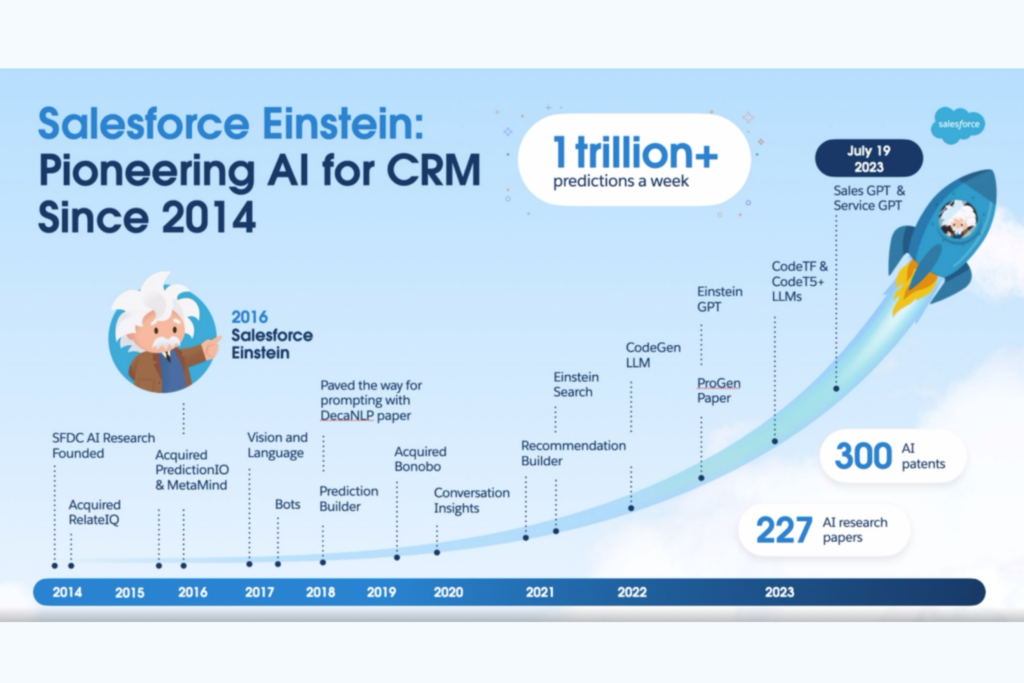
Einstein and beyond: The generative AI phase
The introduction of Salesforce Einstein marked the beginning of a new era – the Generative AI Phase. Einstein evolved to be a cornerstone in CRM AI, generating over a trillion predictions weekly and empowering users to craft custom AI models using tools like Einstein Prediction Builder. The emergence of generative AI technologies, catalyzed by advancements like OpenAI’s ChatGPT, opened new avenues for Salesforce in deep learning and generative AI. Strategic acquisitions and leadership from AI experts propelled Salesforce’s AI research forward, leading to notable developments in large language models and their practical applications. By 2023, Salesforce had begun weaving generative AI throughout its platform, enhancing features from automated content creation to conversation summarization.
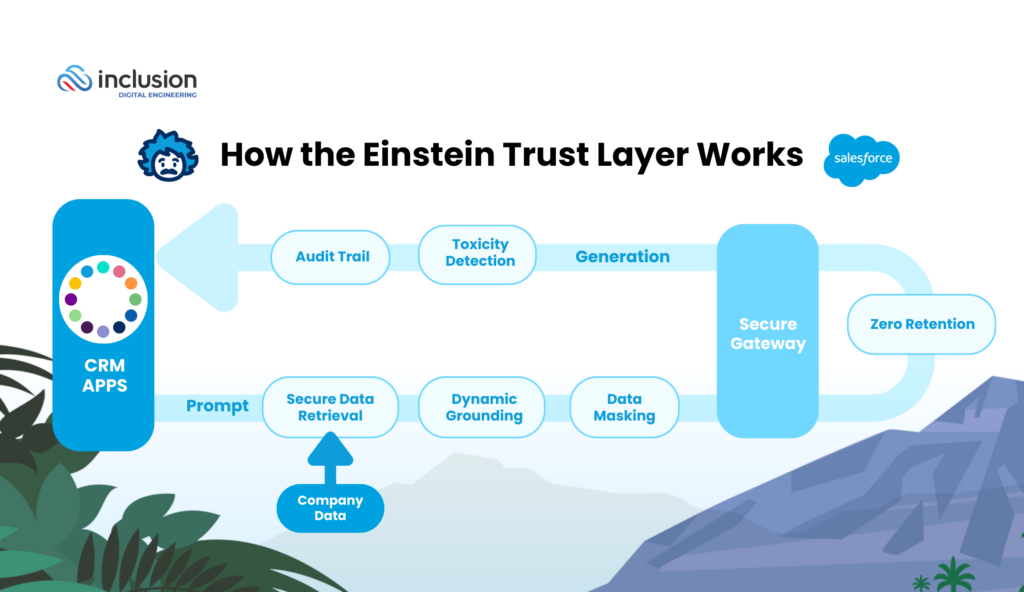
3 Dimensions Undergoing Substantial Changes in 2024
Salesforce’s generative AI ecosystem has a profound impact on end-users, job creation, and business outcomes, driven by the crucial role of cloud computing in facilitating high-quality generative AI.
For end-users, the integration of generative AI enhances user experience and efficiency by automating tasks, boosting job performance, and reducing repetitive work.
On the employment front, the AI applications within Salesforce are expected to create 4.7 million direct jobs by 2028, reflecting the growing demand for AI expertise in various roles.
Business outcomes are transformative, with AI-powered solutions projected to generate $948 billion in new revenues for customers by 2028, driven by AI adoption in critical business functions.
Now, let’s explore the three dimensions profoundly affected by the democratization of generative AI in 2024 and beyond:
1. Changes in Salesforce’s Users
Productivity boost for your team:
Consider Salesforce’s Prompt Studio, an AI-driven tool designed to assist Salesforce Admins by automating basic tasks, such as data entry and scheduling follow-ups, thereby allowing them to concentrate on more strategic duties. The integration of Einstein across the Salesforce product suite is significantly enhancing user experience. For instance, sales reps can now leverage AI to succinctly summarize key points from calls or to automatically create sales emails that are tailored based on customer history and needs. This not only elevates efficiency but also ensures more personalized customer interactions, easing the burden of time-consuming tasks and enabling a greater focus on other critical aspects of the sales process.
Intuitive interface
A significant leap in the intuitiveness of Salesforce’s interface is being driven by the integration of advanced Large Language Models (LLMs) within Einstein. This integration enables a transformative feature for users: the ability to interact with Salesforce using conversational, everyday language.
Imagine a scenario where a Salesforce user, instead of navigating through multiple layers of menus or typing in structured queries, simply asks Einstein a question in everyday language. For instance, a sales manager could ask, “Show me the sales forecast for the next quarter,” or a marketing professional might inquire, “What were the top-performing campaigns last month?” Einstein, powered by LLMs, comprehends these requests and responds with accurate, relevant information or actions.
Advanced reporting:
This conversational interface extends beyond simple queries. Users can command Einstein to perform complex tasks like, “Create a report comparing this year’s sales to last year,” or “Alert me when a high-value client’s engagement drops.” The AI processes these requests, executing tasks or pulling up detailed reports, all through a simple conversation.
Additionally, technologies such as Tableau AI enable users to easily create sophisticated analytics and dashboards. Consider a sales manager who, with a few clicks, can develop a report that not only displays sales success but also forecasts future trends based on current data. These technologies sort through data, uncover trends, and deliver results in visually appealing ways. This functionality is useful for users who do not have extensive data analysis abilities but need to make educated judgments.
2. Changes in Salesforce Jobs
AI won’t take our jobs:
There’s a common question among Salesforce users: ‘Will AI replace our jobs?’ The answer lies in understanding AI’s role – it’s a tool, not a competitor. AI excels in automating repetitive tasks, streamlining processes that are traditionally time-consuming. However, its capabilities stop short when it comes to the nuances of creative thinking, complex decision-making, and understanding the intricate dynamics of different teams. This is where our human skills shine. AI complements our work by handling routine tasks, leaving us free to apply the irreplaceable human touch and deep business insights that only we can provide.
New skills for AI adoption:
As AI reshapes our interaction with Salesforce, it brings about a shift in the skills we need. While AI can manage certain coding tasks or data processing, it doesn’t possess the intuition to understand a company’s unique requirements fully. This gap is filled by our human capabilities – our creativity, strategic thinking, and interpersonal skills.
The question then becomes: ‘In an AI-enhanced world, should we focus more on developing technical skills or soft skills?’ The answer is a balance of both. While AI simplifies technical tasks, the demand for soft skills like empathetic customer understanding and innovative problem-solving is on the rise. The more AI takes on routine tasks, the more valuable our human attributes become, highlighting the importance of a harmonious partnership between AI efficiency and human ingenuity.
A dual-edged sword for Salesforce employees:
While generative AI offers significant advantages, Salesforce research reveals workers’ concerns about its responsible use. Workers worry about AI’s potential for inaccuracy and bias, highlighting a critical need for enhanced security measures and ethical guidelines. About 61% of Salesforce workers currently use or plan to use generative AI, but nearly 60% are unsure about using it with trusted data sources, indicating a gap in AI literacy that needs addressing.
3. Changes in Salesforce Ecosystems for Business
Hyper-personalization:
AI is bringing customization to new heights. Salesforce technologies driven by AI can monitor consumer behavior patterns in real-time, providing hyper-personalized suggestions and experiences. As a result, there is greater engagement and longer-term consumer connections.
A real example of this may be observed in the development of an AI copilot within Salesforce, as outlined in a post by InclusionCloud. The tutorial shows how to build a personalized AI assistant that not only replies to individual client questions but also learns and adapts to consumer preferences over time. This technique proves how organizations may leverage Salesforce AI technologies to build interactive, customer-centric experiences rather than just data analysis.
Advanced automated support:
Customer service bots driven by AI are reinventing the customer support interface. These bots, which can learn from each contact, not only answer typical questions but also predict demands and give proactive answers. Shortly, the goal is to create an automated system that responds in a conversational and human-like language.
Expanding the Salesforce service ecosystem
The growth of AI-powered solutions needs a broad range of supplementary services and byproducts. This expansion includes IT project consulting, staffing agencies, and outsourcing services, implementation partners, additional cloud services like storage and security, and IT training. As businesses adopt AI-powered solutions, these areas will open up new opportunities, creating a comprehensive service provision ecosystem that enhances the overall functionality and effectiveness of Salesforce implementations.
In conclusion, the democratization of generative AI is set to significantly impact the users, jobs, and business ecosystems within Salesforce. These changes promise enhanced efficiency, deeper customer engagement, and a broadening of the service ecosystem, all while underscoring the importance of ethical AI usage and human-AI collaboration.
Biggest Barriers to Change
On the other hand, we could see three significant barriers to AI adoption in business:
Data quality as a primary obstacle:
A crucial barrier is the quality and quantity of data. AI systems are heavily reliant on data. When the available data is of poor quality or limited, the effectiveness of the GenAI diminishes significantly. Salesforce Einstein’s capacity to train AI models using a company’s own data is a critical feature, emphasizing the importance of data quality and richness. When the available data is of poor quality or limited in scale and diversity, the AI’s power to provide exact predictions and valuable insights is severely hampered.
This challenge elevates the importance of data scientists in the AI adoption process. Their expertise is essential not only in establishing and maintaining high standards of data quality but also in conducting thorough data audits.
The talent gap and need for specialized skills:
Despite Salesforce being a low-code platform, the need for specialized skills forms a significant barrier to AI adoption. The absence of professionals with expertise in Salesforce and specific industry knowledge can make the adoption process daunting. The talent gap, particularly a lack of skilled personnel like data engineers and AI modelers, as reported by 35% of respondents in a Salesforce study, is one of the main barriers to the wider adoption of generative AI.
Cultural change and organizational resistance:
Another major hurdle is the need for a cultural shift within organizations to successfully adopt AI. Skepticism about AI’s decision-making process, fears of AI replacing human jobs, and a general lack of understanding or trust in AI’s capabilities often lead to resistance. Additionally, AI integration demands changes in business processes and workflows. Issues like AI governance and risk management, and concerns about trustworthiness and bias in data, further compound these challenges.
In summary, the biggest barriers to AI adoption in businesses encompass not just technical aspects like data quality and the talent gap, but also broader organizational issues such as cultural resistance and concerns over governance, cost, and data ethics. These factors collectively underscore the complexity of integrating AI into business environments.
This leads us to the next question, is a partner truly necessary to implement AI if my company uses the Salesforce platform?
Do you really need a Salesforce Partner to implement AI?
Many organizations are tempted to handle Salesforce AI implementation in-house, attracted by the perceived control and familiarity with internal processes. However, this approach often reveals hidden complexities. The challenge lies not just in setting up Salesforce AI but in tailoring it to align with unique business processes, integrating it seamlessly with existing systems, and maximizing its capabilities for your team. This level of customization and integration demands expertise and time that in-house teams may not have.
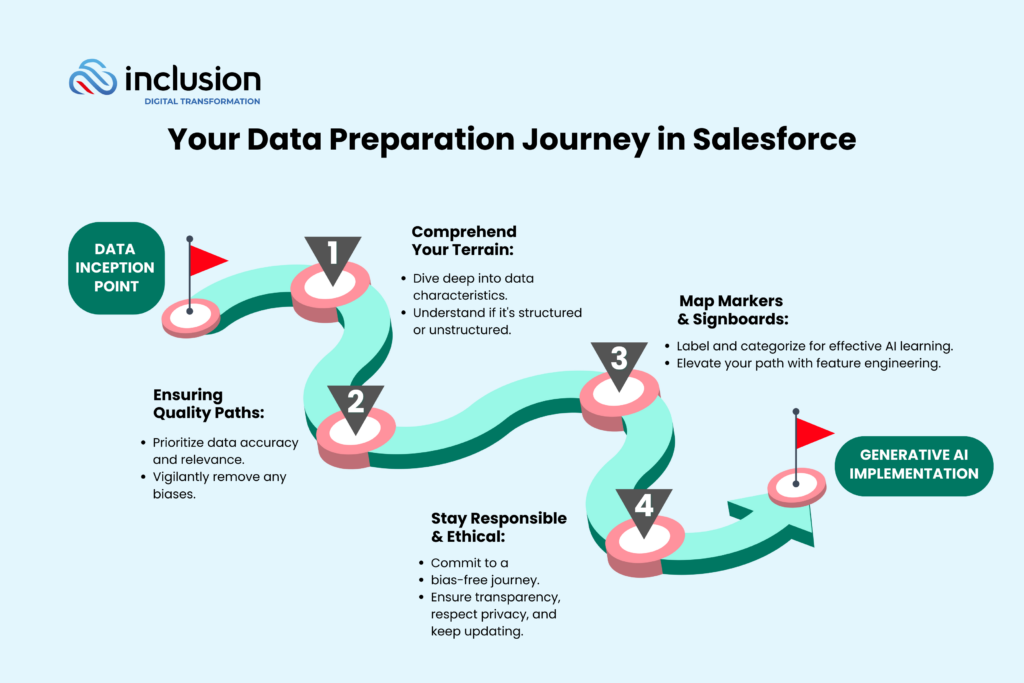
A strategic implementation partner offers much more than technical proficiency. They bring a deep understanding of business operations and can customize Salesforce AI to meet your strategic goals. They are skilled in handling challenging integrations, overseeing complex data migrations, and ensuring that your team is adept at using the system effectively.
Key Considerations for Choosing an Implementation Partner
Complexity of Salesforce AI needs:
If your Salesforce AI requirements are complex, an in-house team, despite being knowledgeable about your company’s operations, may lack the hyperspecialized Salesforce expertise that a partner can provide.
Experience and best practices:
Implementation partners often have a wide range of experience across various industries. They can introduce best practices and innovative solutions that an in-house team might not be aware of. Their experience allows them to anticipate challenges and offer proactive solutions, minimizing the risk of costly errors.
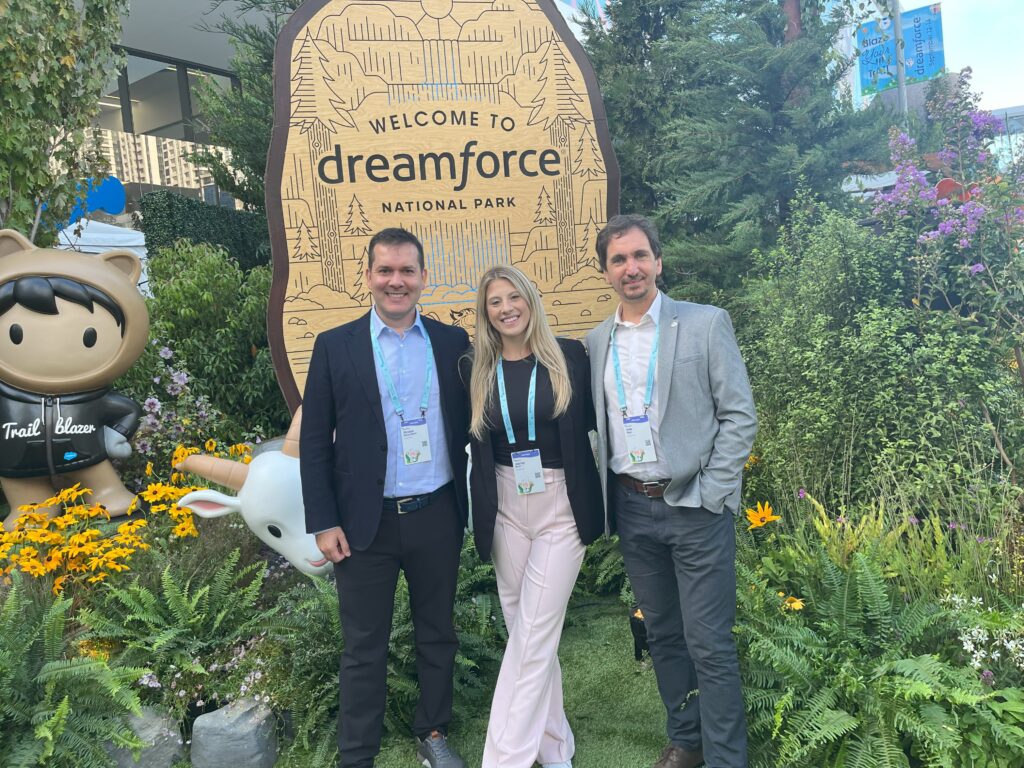
Scalability and resource allocation:
A key advantage of a deployment partner is their ability to scale resources according to your project’s needs. This flexibility is often a challenge for in-house teams who are limited by their regular duties and workforce. Scalable resources ensure that your Salesforce AI implementation is agile and adaptable.
Ensuring data security and confidentiality:
When working with a deployment partner, maintaining data security and confidentiality is paramount. It’s crucial to choose a partner with a strong track record in data security and adherence to industry best practices. Legal agreements, like NDAs, should clearly define the handling of your data. Regular security audits, clear communication protocols for any data concerns, and training your team on these security measures are also essential steps in safeguarding your data.
In conclusion, opting for an implementation partner in deploying Salesforce AI is more than a technical decision – it’s a strategic choice that brings specialized expertise, industry insights, and scalability to your Salesforce AI initiatives. The right partner can significantly enhance the effectiveness of your Salesforce AI implementation, ensuring it’s aligned with your business goals while maintaining the highest standards of data security.
Bottom Line: What’s next for the Salesforce ecosystem?
Over the next few years, we’ll see more businesses integrate GenAI into their strategic vision. With 75% of CEOs believing that sophisticated GenAI will provide a competitive edge and 50% already incorporating it into their products and services, the impact on Salesforce users, job roles, employee satisfaction, and overall business productivity will be substantial.
In 2024, the Salesforce ecosystem is expected to focus on enhancing UX by saving time and shifting from repetitive tasks to more strategic and creative activities. This means that generative AI will play a crucial role in automating routine tasks, such as those in marketing. For example, AI can be used to personalize email campaigns for customers, ensuring that each recipient receives content that is highly relevant to them. By automating this process, it frees up valuable time for marketing teams to focus on strategic planning and the overall development of their brand.
However, this shift also brings a higher demand for specialized roles such as data scientists and AI engineers, essential for keeping efficient and ethical AI systems. These professionals play a crucial role in developing, implementing, and maintaining AI models that align with industry best practices and ethical guidelines. They are responsible for fine-tuning algorithms, ensuring data privacy and security, and minimizing bias in AI outputs.
On the other hand, half of Salesforce users have expressed a need for better understanding and safe use of this technology. This growing awareness underscores the importance of providing training and educational resources to equip users with the knowledge and skills required to leverage AI effectively.
To address these challenges, the rapidly growing Salesforce partner ecosystem is becoming crucial. It offers tailored AI solutions, efficient implementation, and the necessary talent to maximize platform potential. This ecosystem includes a range of services from IT consulting to managed services, indicating a burgeoning full-service ecosystem.
Finally, we must recognize the essential work of the Salesforce community, known as Trailblazers. The Salesforce community, which is always growing and eager to help, is critical to promoting AI adoption. Besides the extensive learning platform Trailhead, community members actively take part by helping and sharing their skills, tips, and professional secrets. This community-driven knowledge sharing is super helpful in handling the changes within the ecosystem.
To keep abreast of these exciting developments in the Salesforce AI landscape, follow InclusionCloud on LinkedIn. It’s your gateway to the latest insights and discussions in the dynamic world of Salesforce.

